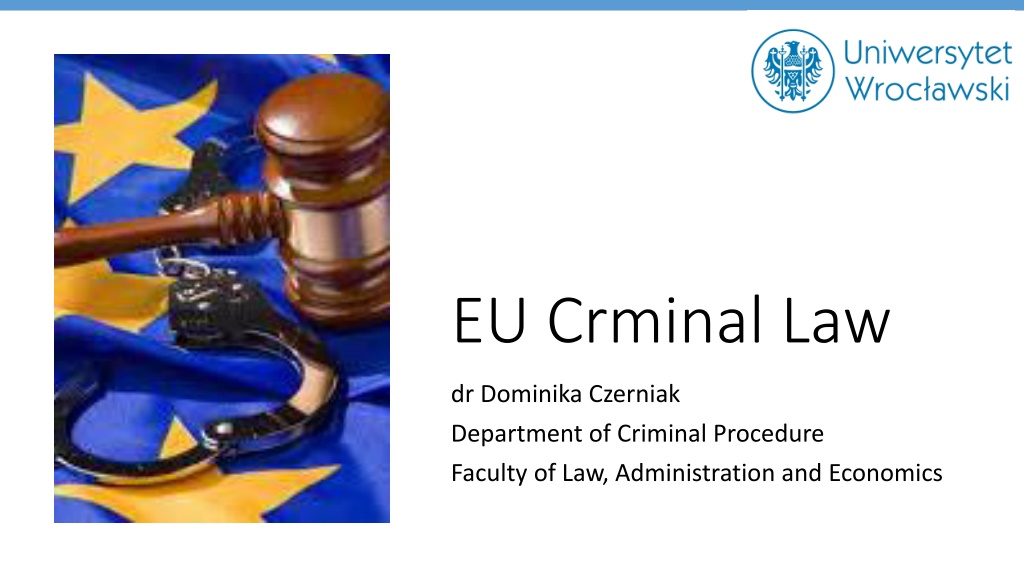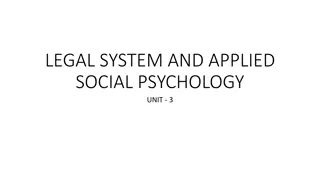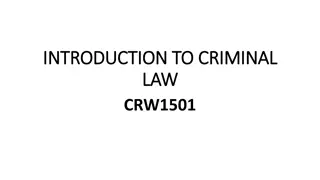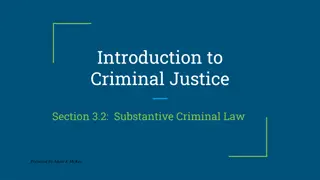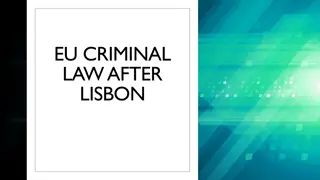EU Criminal Law: History, Cooperation, and Exam Preparation
Delve into the intricate realm of EU Criminal Law with a focus on its history, legal cooperation, and exam essentials. Explore various lecture topics, legal basis, harmonisation, and procedural rights. Engage with textbooks by renowned authors in the field. Prepare for the upcoming semester exam with key information and active participation opportunities. Uncover the basics of terminology and international criminal law, including examples and conventions governing international crimes and cooperation between legal systems.
Download Presentation

Please find below an Image/Link to download the presentation.
The content on the website is provided AS IS for your information and personal use only. It may not be sold, licensed, or shared on other websites without obtaining consent from the author.If you encounter any issues during the download, it is possible that the publisher has removed the file from their server.
You are allowed to download the files provided on this website for personal or commercial use, subject to the condition that they are used lawfully. All files are the property of their respective owners.
The content on the website is provided AS IS for your information and personal use only. It may not be sold, licensed, or shared on other websites without obtaining consent from the author.
E N D
Presentation Transcript
EU Crminal Law dr Dominika Czerniak Department of Criminal Procedure Faculty of Law, Administration and Economics
Introduction History of the EU Criminal Law Lecture topics Legal basis and forms of cooperation in criminal matters Harmonisation of substantive criminal law Procedural rights
Textbooks and books: Roberto E. Costoris, Handbook of European Criminal Procedure, Springer 2018 Valsamis Mitsilegas EU Criminal Law after Lisbon: Rights, Trust and the Transformation of Justice in Europe, (Hart Studies in European Criminal Law) 2018 Andre Klip, European Criminal Law, Intersentia 2016 Kai Ambos, European Criminal Law, Cambridge UP 2020 Samuli Miettinen Criminal Law and Policy in the European Union , Routledge 2013 During the lectres I will send you some extra materials (jugdments, directives, articles etc.)
Exam (next semester) Written examination (3 questions concerning issues listed on lecture topics slide) Active participation in lecture will be taken under consideration (final grade raised 0,5) The lecturer will share a list of 40 exam questions at the beginning of the second semester
Basic terminology
International criminal law Body of laws, norms, and rules governing international crimes and their repression, as well as rules addressing conflict and cooperation between national criminal-law systems. Three distinct areas: 1. cooperation between different national legal systems through extradition and other forms of mutual legal assistance; 2. the prohibition and punishment of certain behaviour by several countries acting collectively or by the international community as a whole; and 3. the operation of autonomous international legal systems, including courts and other mechanisms of enforcement, that exist alongside national criminal law https://www.britannica.com/topic/international-criminal-law
International criminal law Examples Council of Europe Conventions European Convention on Extradition 1957 European Convention on Mutual Assistance in Criminal Matters 1959 Cooperation between different national legal systems through mutual legal assistance Lots of conventions (Council of Europe conventions and UN conventions have some provision refering to the cooperation in criminal matters); e.g. International Convention against the Taking of Hostages, adopted by the General Assembly of the United Nations on 17 December 1979 International Convention for the Suppression of the Financing of Terrorism, adopted by the General Assembly of the United Nations on 9 December 1999
International criminal law International Convention Against the Taking of Hostages 1979 United Nations Convention against Corruption 2003 United Nations Convention against Transnational Organized Crime 2000 Criminal Law Convention on Corruption 1999 The prohibition and punishment of certain behaviour by several countries acting collectively or by the international community as a whole Convention on Cybercrime 2001 Council of Europe Convention on preventing and combating violence against women and domestic Violence 2011 Council of Europe Convention on the Protection of Children against Sexual Exploitation and Sexual Abuse 2007
International criminal law Rome Statute of the International Criminal Court 1998 Security Council Resolutions (1993, 1994): International Criminal Tribunal for the Former Yugoslavia International Criminal Tribunal for Rwanda Autonomous international legal systems, including courts and other mechanisms of enforcement, that exist alongside national criminal law Other internationalised criminal courts (East Timor, Sierra Leone) https://www.icc-cpi.int/ the problem of the effectiveness of international criminal tribunals
International criminal law ICC and war in Ukraine: Ukraine is not a State Party to the Rome Statute, but it has twice exercised its prerogatives to accept the Court's jurisdiction over alleged crimes under the Rome Statute occurring on its territory, pursuant to article 12(3) of the Statute. The first declaration lodged by the Government of Ukraine accepted ICC jurisdiction with respect to alleged crimes committed on Ukrainian territory from 21 November 2013 to 22 February 2014. The second declaration extended this time period on an open-ended basis to encompass ongoing alleged crimes committed throughout the territory of Ukraine from 20 February 2014 onwards. Autonomous international legal systems, including courts and other mechanisms of enforcement, that exist alongside national criminal law On 28 February 2022, the ICC Prosecutor announced he would seek authorisation to open an investigation into the Situation in Ukraine, on the basis of the Office's earlier conclusions arising from its preliminary examination, and encompassing any new alleged crimes falling within the jurisdiction of the Court . https://www.icc-cpi.int/ukraine
International criminal law There is also a proposition of creating new special international tribunal to deal with war crimes in Ukraine. President Volodymyr Zelenskyy has called for an additional route: a special tribunal focused exclusively on the crime of aggression against Ukraine. The crime of aggression is, in short, the use of armed force to invade a sovereign state so while war crimes refer to how war is fought, aggression covers how war starts. The proposed tribunal has drawn considerable debate and discussion, but Ukraine has garnered support among partner states and international bodies. The launch of such a tribunal would undeniably be significant, allowing a venue for the first international criminal trial on aggression since the aftermath of World War II. However, its creation would leave several open questions on the future of accountability for aggression both in the context of Ukraine and for future and past incidents which must also be addressed . https://www.atlanticcouncil.org/blogs/new-atlanticist/how-ukraines- proposed-special-tribunal-for-russian-aggression-would-work/ https://www.justiceinfo.net/en/110201-everything-you-need-to-know- argue-special-tribunal-russia-crime-of-aggression.html Autonomous international legal systems, including courts and other mechanisms of enforcement, that exist alongside national criminal law
European criminal law A regional (European) system of law that is part of international criminal law. European criminal law consists of three types of rules: 1) criminal law norms governing cooperation in criminal matters (within the CoE and the EU); 2) the rules of substantive and procedural criminal law and the ECHR, which constitute the system for the protection of human rights and fundamental freedoms, 3) EU criminal law
European criminal law The most important convention European Convention of Human Rights (ECHR). https://www.echr.coe.int/documents/conv ention_eng.pdf The Convention does not exist in practice without the case law of the ECtHR. The Court adjusts the Convention to the needs of the world today. Specific methods of interpreting the Convention have been developed so that, without changing it, it can be applied to the greatest possible extent.
European criminal law The concept of a criminalcharge has an autonomous meaning, independent of the categorisations by the national legal systems of the Member States. The starting-point for the assessment of the applicability of the criminal aspect of Article 6 of the Convention is based on the criteria outlined in Engel and Others v. the Netherlands, 82-83: (1) classification in domestic law; (2) nature of the offence; (3) severity of the penalty that the person concerned risks incurring.
European criminal law Where is a victim of a crime in the ECHR? There are no provisions in the ECHR that explicitly grant rights to the victim of a crime. Rights for the victim of a crime have been interpreted by the ECHR from Article 6(1) (the civil part of this provision) and from Articles 2, 3, 4 and 8 of the ECHR (the concept of positive procedural obligations of the state). https://ks.echr.coe.int/web/echr-ks useful tool for finding recent judgments of the ECtHR. <--
EU criminal law substantive criminal law, procedural criminal law, rules on judicial cooperation between EU countries. EU criminal law is based on partly different rules than international (European) criminal law. 1. Mutual trust between the EU countries 2. Mutual recognition of judical decisions(not mutal legal assistance) 3. There is no principle of reciprocity in the EU countries 4. The possibility of forcing an EU country to implement certain provisions
National criminal law the body of law that defines criminal offenses, regulates the apprehension, charging, and trial of suspected persons, and fixes penalties and modes of treatment applicable to convicted offenders. https://www.britannica.com/topic/criminal-law Substantive criminal law Criminal procedure Criminal law enforcement Criminal law is strongly conncted with the state sovereignty and legal culture. E.g. some behaviour which is a criminal offence in Poland is considered a civil tort, misdemeanour, etc. in other countries.
Criminal liability In simplest terms, when you are criminally liable, it means you may be held legally responsible for breaking the law. This can be potential or actual responsibility meaning that you actually committed the crime, or that you are simply suspected of committing it. If the liability is proven in court, you will be held responsible for the crime and sentenced accordingly. In cases of criminal liability, the government believes you may have committed a criminal act, and the government prosecutes the case in court. In most cases (not all), criminal liability hinges on two elements: the actus reus (the actual act or omission that violated the law) and the mens rea (the intention to commit) . https://federalcriminallawcenter.com/2015/01/criminal-liability/
Criminal procedure The law of criminal procedure regulates the modes of apprehending, charging, and trying suspected offenders; the imposition of penalties on convicted offenders; and the methods of challenging the legality of conviction after judgment is entered. Litigation in this area frequently deals with conflicts of fundamental importance for the allocation of power between the state and its citizens. https://www.britannica.com/topic/proced ural-law/Criminal-procedure#ref397607
Criminal procedure Each country has its own system of criminal procedure. The EU/ECtHR do not address organisational issues e.g. stages of proceedings, importance of pre-trial proceedings, composition of courts. The criminal procedural law system is intended to guarantee a fair trial in accordance with Article 6 ECHR (and 47 CFR). The EU law addresses, inter alia, the rights of the accused and the victim in a criminal trial.
Harmonisation of law The process by which two or more states, sometimes under the auspices of an interstate or international organization, change their legislation relevant to some area of common concern to conform their statutes and to facilitate compliance and enforcement across borders. In the EU harmonisation is made by the directives. Harmonisation - it is the final result (the existence of an accused/victim's legal right) that is important, not the method by which this was achieved
Unification of law Unification - the unification of laws within a given territory. Replacement of national regulations with supranational solutions. In the area of criminal law, this form is very rarely used. Possible through regulations.
Approximation of law Approximation of laws of the EU Member States. The aim is not to replace national solutions but to introduce common standards in a certain area. Integration of law Positive - introducing certain solutions (e.g. minimum standards for procedural rights of accused, criminalization of the same offences, common criminal sanctions) Negative - identification of unlawful actions by public authorities.
Reasons why the EU changed the scope of its competences to criminal law 1. the lack of internal borders encourages the transfer of crime 2. protection of the EU's financial interests 3. ineffectiveness of the standard of human rights protection provided by the membership of the EU Member States in the Council of Europe 4. increased protection of the rights of persons involved in criminal proceedings 5. strengthen mutual trust 6. to build an area of freedom, security and justice
Next time History of EU crminal law and cooperation in criminal matters EU Criminal Law before and after Lisbon Treaty
